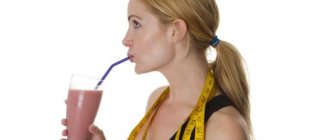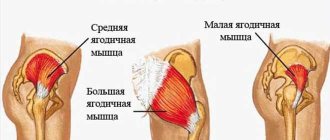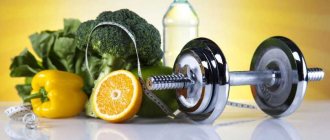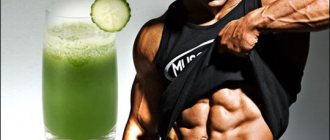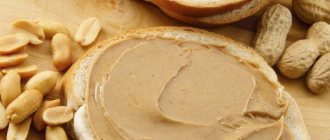During physical activity, our body works more intensely: metabolism accelerates, heart rate increases, and sweating increases. In the end, we lose fluid faster, and we need it to maintain a normal metabolism. When there is a lack of fluid, we feel thirsty, which is a completely normal need. Let's figure out how to consume water and whether it is possible to drink correctly after training.
- Is it possible or not to drink water immediately after training? Do I need to wait some time and why?
- How much water can you drink after training?
- What kind of water is right to drink?
- Water for drying muscles and losing weight
Is it possible or not to drink water immediately after training? Do I need to wait some time and why?
It is a fact that our body is 70–80% water, which can be lost in large quantities during training. It is very important to replenish the balance after training, otherwise the body turns on a “special mode” and begins to more intensively store the fluid received during the day, which can lead to swelling.
After sports activities, you need to drink water gradually, without emptying the entire bottle at once in one sip. In addition, it is important to drink water at room temperature or slightly chilled, but not ice-cold.
Among other things, consuming water after training promotes the normal elimination of breakdown products of complex substances formed during physical activity, returns the pulse to normal and normalizes blood pressure, stimulates the body to become more resilient and fills it with necessary microelements and beneficial salts.
If you set yourself the task of losing weight through physical activity and proper nutrition (these two components must work together), then without consuming water after training, this is simply impossible, since in order for all substances entering the body to be properly absorbed, they must dissolve in liquid.
After a weight loss workout, it is very important to drink a small amount of water to speed up your metabolism.
If the training is aimed at increasing body weight, then you also cannot do without water after physical activity! After such strength exercises, a lack of moisture occurs in the joints of our body. After finishing the workout, the required amount of missing moisture must be replenished.
Post-workout fluid
In addition to drinking water after a workout, a contrast shower can serve as a contrast shower, which will improve your general condition, relieve the body of dehydration and saturate it with moisture.
In what cases is it not recommended to drink?
Water certainly benefits athletes, but there are exceptions to any rule:
- Drinking is not recommended during and immediately after sports that require good endurance - running, wrestling, boxing, kickboxing.
- It is necessary to limit the amount of fluid consumed if the kidneys were injured during one of the types of martial arts - an excessive amount of fluid will negatively affect the regeneration process of the damaged organ. In this case, it is advisable not to drink water, but simply rinse your mouth.
In any case, you shouldn’t decide on your own to drink or not drink after a workout; if controversial issues arise, it is better to consult with a trainer or doctor.
How much water can you drink after training?
We already know whether it is possible to drink water after a workout and that it should even be done, but now - how much can you drink? Before and after physical activity, it is advisable to step on the scales and compare the numbers obtained. The difference you get will be the amount of water lost during the workout (and not the supposedly lost fat instantly). So, after weighing, you need to drink a glass - about 250 ml - of warm water in small sips. The remaining amount of fluid can be replenished within an hour by taking a few sips of water approximately every 10–15 minutes. But still, it is best to listen to your own body and its need for fluid at the moment.
Which water to choose?
What kind of water can you drink after training? From the huge variety, it is better to choose still mineral water or electrolytic solutions; they perfectly help cope with thirst and restore the balance of salts and trace elements.
Under no circumstances should you choose sweet, carbonated water. Also, do not forget that you do not need to load your body with a large amount of water after training, and also about the temperature of the liquid, it should not be cold. You can drink warm tea, preferably green or herbal, cocoa or coffee, but no more than one cup, otherwise your heart rate may suffer. After half an hour, you can drink a protein shake, milk, kefir or yogurt.
Perhaps this is where we should end this short note. There's no point in making la-la noises about this. I hope I helped answer your question about water after training, which, by the way, worries many. Personally, this question has never seriously bothered me. I drink water throughout the workout and after it and don’t worry about it, which is what I advise you to do. The main thing is don’t let yourself dry out! Bye bye…
comments powered by HyperComments
PS Subscribe to blog updates,
so you don't miss anything!
I also invite you to my Instagram
What kind of water is right to drink?
It is advisable to drink clean water, especially if your workout lasted about an hour or more. Non-carbonated mineral water or water passed through a special filter is best. You can add a slice of lemon to plain water if you want to make the drink healthier or just add flavor.
When it comes to flavored water from stores, you have to be careful. Why? Because the composition may contain excess carbohydrates and chemical additives that should not be consumed.
Can I add anything for taste?
If for some reason it is difficult for you to constantly drink plain water, you can add some variety to your post-workout drinking menu:
- Water with lemon.
Lemon juice helps normalize metabolism, which is especially important for people trying to lose weight. - Water with honey.
Honey is an excellent natural sugar substitute. At the same time, it is much healthier than the sweet white crystals we are used to. Among other things, honey has a beneficial effect on brain function, strengthens the immune system, and calms the nervous system. - Water with mint.
The piquant taste and smell of mint tones and helps restore strength after an active workout. Mint dulls hunger and enhances metabolism. - Water with cucumber.
Recently, it has been leading the ranking of detox drinks: cucumber water not only perfectly quenches thirst, but also helps remove toxins, dulls the feeling of hunger, and has a beneficial effect on the functioning of the cardiovascular system. - Water with berries.
These can be either fresh fruits or frozen. Berries make the drink aromatic and also enrich the body with important vitamins and minerals.
If you can't decide what to add to the water for flavor, you can try making your own fitness mix: mix lemon and lemon or berries and honey.
Water for drying muscles and losing weight
In the process of drying the body, water rids the body of harmful substances and salts. Accordingly, during the period of muscle drying, it is necessary to increase the volume of water entering the body. The desired amount of water consumed per day for a specific person can only be determined by a specialist; this is due to the individual needs of each organism.
The optimal amount of water consumed during drying depends on the intensity of your workout and the characteristics of your body.
How and how much water you need to drink depends on the training regimen and the degree of load - the higher the load and the more intense the workout, the more fluid the body loses, which means the volume of required water consumption will increase. On average, you need to drink 1.5 liters of water during training, approximately 300 ml before and after training.
There is no good reason to prohibit the consumption of clean water after training, since the liquid itself is very important for our body - especially in the process of its recovery. It is very important to listen to the body's fluid needs and remember that after any sport we need to replenish the lost fluid balance.
What happens if you drink too much?
Water, of course, brings invaluable benefits to the body, but this rule only works if drinking measures are followed. If you drink more than the body is able to absorb and process, the following symptoms of overhydration (increased water content in the body's cells) inevitably appear:
- Reduced body temperature.
- Increased salivation.
- Edema (on the face, legs, arms, in especially severe cases - pulmonary edema and cerebral edema).
- Nausea, vomiting, diarrhea.
- Muscle weakness, cramps.
- Impaired coordination of movements.
Overhydration is often called “water poisoning” - it has essentially the same symptoms as regular poisoning and causes similar complications.
What can you drink instead of water?
If for some reason you cannot drink the recommended amount of liquid, you can replace plain water with other drinks:
- When gaining weight.
In this case, a high-carbohydrate gainer, a protein shake, and freshly squeezed natural juice would be useful. You can also drink a glass of milk or kefir. - When drying.
In this case, it is recommended to drink as much fluid as possible, while minimizing the amount of fat and carbohydrates consumed. That's why trainers recommend drinking a protein shake or a glass of iced herbal tea after your workout. - When losing weight.
If your main goal is to lose weight and reduce body size, after training you can drink a glass of cool ginger tea and 150-200 ml of kefir.
It is not recommended to drink tea or coffee immediately after training - these drinks interfere with the full gain of muscle mass and can also have a bad effect on the functioning of the heart.
Sports supplements
Most sports supplements are available in easy-to-use forms - tablets, capsules.
However, there are also products in powder form that need to be dissolved in liquid before taking - these include amino acids, BCAAs, creatine, glutamine. All of these sports supplements can be taken after training, and it will be very convenient to dissolve them in a glass (or shaker) of water.
On the subject: Muscles are swollen after training
Water consumption rate
In order to form the correct drinking regime, you need to know the daily norms of water consumption:
- For women - 30 ml per kilogram of weight.
- For men – 40 ml per kilogram of weight.
During sports, water consumption rates increase slightly by an average of 500-1000 ml per day.
It is important to understand that drinking a liter of water in one gulp will not bring any benefit to the body, and on the contrary, it will put unnecessary strain on the heart. Therefore, the recommended volume of liquid should be divided into several doses - 150-200 ml each.
Source
General tips and recommendations for maintaining the body's water balance
You can drink water during training, but you should understand how much you need and how to do it correctly. To avoid harming yourself, you need to listen to the following tips:
- You need to drink in small sips, better a little, but more often;
- the water should be chilled, but not cold, as this may cause a cold;
- After each exercise, you should take 2-3 sips of water, this will help maintain water balance and prevent dehydration;
- 2 liters of water should be drunk per day, and not within 60-90 minutes in the gym;
- You can drink water (mineral or raw) and special sports cocktails; it is better to talk to your coach about the composition of such drinks and their necessity.
Liquid containing salt is a bad aid for an athlete. Salt retains moisture and promotes swelling. Water with sugar or honey is a great option for those who do squats, running or swimming. When losing weight, it is better to give preference to regular non-carbonated mineral water.
The most effective drink for athletes today is considered isotonic. It is water rich in salts, amino acids, vitamins, carbohydrates and L-carnitine. The drink is useful, but has a high cost.
What to drink is a purely personal question, which everyone decides for himself, focusing on the needs of the body and financial capabilities.
Why drink water
A person consists of millions of small cells - cells. Every cell is more than 90 percent water. Water is 2 hydrogen atoms and 1 oxygen atom. What then, you ask, takes up the remaining 10 percent? Dry residue. These are different substances: proteins, fats, carbohydrates, micro and macroelements.
So, water is the solvent of all substances. Water actually has many functions. And it is the presence of water on Earth that makes the planet suitable for life.
The role of water in the body:
- Maintains a constant internal environment.
- Water provides stable pressure that prevents the cell from collapsing. It creates volumes, provides mechanical strength and elasticity of the cell.
- It is a solvent for all substances, a medium for chemical reactions.
- This is a thermostat. Water has excellent heat capacity and retains heat. This makes it easier to regulate our body temperature.
- Transport within the body for all substances.
- And much more.
Let's complete the logical chain: no water - there will be no life.
On the one hand, water is contained in the body. On the other hand, we sweat, spit, cry, and go to the toilet. That is, we constantly release water. And a lot of substances, too, by the way.
Hence the need to drink liquid. Our body is designed very cunningly - it’s impossible to “forget” to drink water. The body ensures a constant flow of fluid into the body due to the feeling of thirst.
Another question is that this thirst begins to torment a person when drinking is already vitally necessary. Until this moment, thirst can be ignored. This is the problem of many people, which is why they do not gain the required number of liters per day.
So, you need to drink water in order to live. It's simple.
General information
Water is an important component of our body. More than 60% of the body consists of fluid. In the process of performing training complexes, it actively consumes water for:
- Thermoregulation;
- Glycogen breakdown;
- Binding of the formed sugar;
- Transportation of oxygen;
- Reducing the load on the cardiovascular system.
Thermoregulation is carried out by sweating. It is the fluid that comes out that prevents us from overheating while running or lifting a heavy barbell.
During the performance of heavy complexes, the body actively breaks down internal glycogen, which turns into glucose. For transportation and combustion, glucose molecules bind part of the water molecules, which burns along with them.
The body receives air through the lungs, but few people think that the main transport cells for oxygen in the body are blood cells, which also consist of water. The thinner the blood in the body, the easier it is for the heart to pump it. Training complexes actively waste our fluid, which is a strong stress for the body, which it cannot overcome on its own due to the lack of a replenishable resource - fluid.
Myths associated with water
The main myth associated with water goes something like this: “When losing weight, you need to drink as little as possible, because the fluid that accumulates in the body adds a couple of unwanted kilos.”
In fact, everything is quite the opposite - if you prefer to actively train, then you simply need to drink water to replenish the fluid expended during exercise. Otherwise, you will face dehydration with all the ensuing consequences.
The mechanism of how the body works is simple - the more fluid we consume, the greater the amount of it is excreted naturally, and with it, toxins and wastes “go away”, and weight is normalized.


